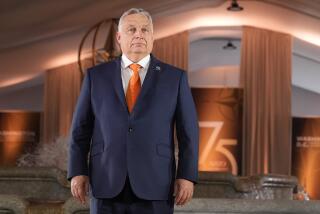Questions at Summit for Clinton
- Share via
WASHINGTON — There is a world out there, and President Clinton is about to escape to it.
Clinton will visit Helsinki next week for a summit meeting with Russian President Boris N. Yeltsin--no doubt with a considerable sense of relief that, for a few days at least, he can leave behind a Washington so feverishly self-absorbed in the investigations of questionable fund-raising that it seems unable to talk or think about anything else.
The Helsinki summit will be significant not only for its own sake, but because it should give us a first, tentative answer to a broader question: Is Clinton going to be able to accomplish anything in his second term? Or will his second administration eventually become so hobbled by the current scandal that it will limp along until (thanks to Congress’ infuriating unwillingness to do anything about campaign-finance reform) it is soon time for yet another election under the same miserable system?
Over the next year or two, Clinton faces some foreign-policy issues that could help determine America’s relations with the world for the next decade or more: Should China be admitted to the World Trade Organization? Should the North American Free Trade Agreement be expanded to other countries?
Such questions ought to be argued out. The danger is that new initiatives will be shelved (or, alternatively, slipped through without much public scrutiny) because Washington is transfixed in its love for the entertainment and the gamesmanship of a good scandal.
Probably no foreign-policy issue is more important and pressing than NATO expansion. That will be the item at the top of the agenda when Clinton meets Yeltsin in Helsinki.
The United States and its NATO allies are preparing to admit Poland, the Czech Republic and Hungary--all of them once tied to the Soviet Union in the Warsaw Pact--into the organization this summer. Russia has been determinedly opposed to a NATO expansion that will bring the Western alliance eastward, nearer its borders. Yeltsin reaffirmed last week his “profoundly negative view” of NATO expansion.
The question in Helsinki is whether the Clinton administration will or should do anything to mollify the Russians. Administration officials admit that they have given up hoping Yeltsin will give his blessing to NATO expansion. “The Russians have made very clear that they hate NATO enlargement, and they aren’t going to stop just because we tell them it’s good for them,” observed one senior U.S. official.
Nevertheless, Russian leaders could still tacitly or grudgingly accept what they don’t like. In an interview this week, Deputy Secretary of State Strobe Talbott said he was hoping for “a de-escalation of their rhetoric against [NATO expansion].”
The Russians now seem to be bargaining. They would like to obtain as many assurances as possible limiting the scope and the impact of NATO expansion.
America and its NATO allies already have made plain that they will not deploy nuclear weapons in the newly admitted nations. Russia also is seeking restrictions on the deployment of NATO troops and military infrastructure in these countries. It is looking for some promises that NATO won’t later expand to the Baltic states or Ukraine. And it is seeking some promise that Russia itself will get some role in NATO deliberations.
“It’s very clear that there will be some kind of deal [over NATO expansion],” says Dimitri Simes, a Russia scholar at the Nixon Center for Peace and Freedom.
Such a deal could be worthwhile, so long as Clinton doesn’t give away too much. The United States and its allies can’t give Russia a veto over NATO decisions, or promise to write off the Baltics. They could, however, try to ease some of Moscow’s fears.
This is where the Washington fund-raising scandal kicks in. The expansion of NATO will have to be submitted to the Senate for ratification, probably early next year. What will Clinton’s public standing be then? Will he be too weakened by the scandal and will Congress be so swept up in the controversy to deal with key issues like NATO expansion?
There is certainly precedent for such a problem: By 1974, anything Richard Nixon did in foreign policy was perceived at home as merely an effort to divert attention from Watergate. The current affair hasn’t reached that level yet. And there are many other differences between the current situation and 1974: America’s economy is thriving and the nation is not enmeshed in any overseas ventures like the Vietnam War.
In a way, Clinton’s summit with Yeltsin heralds the start of his second administration, at least for foreign policy. The past two months have been a remarkably quiet interlude. America has faced no crises overseas.
Now, in Helsinki, Clinton will have to start making some choices about America’s relations with the rest of the world. And we will begin to see the extent to which the ongoing investigations hurt U.S. foreign policy.
The fund-raising scandal needs to be fully investigated. But Washington also needn’t focus on it to the exclusion of everything else.
Jim Mann’s column appears in this space every other Wednesday.
More to Read
Get the L.A. Times Politics newsletter
Deeply reported insights into legislation, politics and policy from Sacramento, Washington and beyond. In your inbox twice per week.
You may occasionally receive promotional content from the Los Angeles Times.










